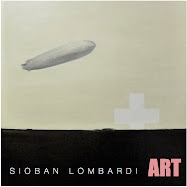 |
| Audubon Bird Guide, Eastern Land Birds, (c)1946, Doubleday |
When I was about 4, my parents brought home a variety of little
toy plastic birds. I can’t remember if they came gradually or all at once, but I
recall a fairly large number and variety. They were probably purchased at
Valueville or Shopper’s World. Lifelike replicas of their natural counterparts,
each bird came in its own colorfully-printed paper box that identified the
species, its habitat, and its characteristics. The largest was no more than 3”
in length. I think my brothers and sister accumulated most of the birds, but I
had one, a Yellow-bellied Sapsucker. I hadn’t thought about those birds for
more than 50 years, but the memory of them came flooding back when viewing The Secret Birds, an
exhibition of work by Chicago Artist Tony Fitzpatrick at the DePaul Art Museum.
The show includes Fitzpatrick’s fantastically-imagined
tableaux, drawn collages of birds, that are constructed with words, imagery,
and twentieth century ephemera, much of it from Chicago. The birds are soothsayers and harbingers,
saints and sinners, provocateurs and teachers. They pay homage and they reflect.
They seem to occupy that same but different
magical space imagined in the work of Joseph
Cornell.
The Secret Birds brought
so many memories to mind – of my late parents, my childhood, books, poetry, and
the city. They do not however evoke any sanitized and nostalgic desire for things
past. Instead, they create a longing, a mourning for the city I now know Chicago
will never become.
The Secret Birds is open at the DePaul Art Museum, 935 W
Fullerton, Chicago, IL 60614, though August 21, 2016. The accompanying publication Is available
through Curbside Splendor
Publishing.




